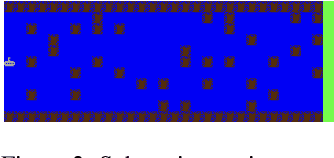Olivier Moulin
Improving generalization in reinforcement learning through forked agents
Dec 14, 2022Abstract:An eco-system of agents each having their own policy with some, but limited, generalizability has proven to be a reliable approach to increase generalization across procedurally generated environments. In such an approach, new agents are regularly added to the eco-system when encountering a new environment that is outside of the scope of the eco-system. The speed of adaptation and general effectiveness of the eco-system approach highly depends on the initialization of new agents. In this paper we propose different techniques for such initialization and study their impact.
Improving adaptability to new environments and removing catastrophic forgetting in Reinforcement Learning by using an eco-system of agents
Apr 13, 2022



Abstract:Adapting a Reinforcement Learning (RL) agent to an unseen environment is a difficult task due to typical over-fitting on the training environment. RL agents are often capable of solving environments very close to the trained environment, but when environments become substantially different, their performance quickly drops. When agents are retrained on new environments, a second issue arises: there is a risk of catastrophic forgetting, where the performance on previously seen environments is seriously hampered. This paper proposes a novel approach that exploits an ecosystem of agents to address both concerns. Hereby, the (limited) adaptive power of individual agents is harvested to build a highly adaptive ecosystem. This allows to transfer part of the workload from learning to inference. An evaluation of the approach on two distinct distributions of environments shows that our approach outperforms state-of-the-art techniques in terms of adaptability/generalization as well as avoids catastrophic forgetting.
 Add to Chrome
Add to Chrome Add to Firefox
Add to Firefox Add to Edge
Add to Edge